People, planet and profit in publishing
Scroll down to continueNew Society Publishers staff gather in the backyard. Photo by Josee Velsen.
Can a company survive the turbulent publishing industry and fulfill a commitment to environmentalism and social justice? New Society Publishers has been proving it possible for over 40 years.
Based in a picturesque wooden building on British Columbia's Gabriola Island, the company publishes world-renowned books on sustainability and progressive issues. But it doesn't just promote progressive ideals, the publishing house is equally committed to practicing them. New Society is structured as an employee trust — a "B Corp" before the term even existed — the founding owner, shareholder and employees share equal parts in the company's ownership.
If it sounds innovative, that's because it is — just seven to 10 per cent of Canadian companies participate in any form of employee ownership, let alone such a large tranche of the business.

The company has turned the old corporate paradigm on its head. Not only incorporating the environment and human well-being in decision-making but fully embracing progressive values and making them a pillar of the company's identity.

If you're going to print books, you're going to use a lot of paper. New Society Publishers rose to this challenge and addressed it head on, becoming the first publisher in North American to commit to printing all of their books on Forest Stewardship Council-certified, 100 per cent post-consumer recycled paper. The acid-free paper is 100 per cent old growth forest free, processed chlorine free, and printed with vegetable-based inks. Each book printed has a summary of the environmental benefits on its the back page. New Society Publishers is also committed to printing all of their books and catalogs in North America, and not overseas. This dedication to high environmental standards and socially just action influences their publishing mandate in fundamental ways from their editorial content to printing and pricing.
It's an encouraging story of a company doing well while doing good.
A new business model
Scroll down to continueThe company's growth hasn't been without challenges. Like many publishing houses it's had a few near death experiences. The company's evolution to an employee trust was one such story.
At one point, New Society was owned by publishing giant Douglas and McIntyre. The company found itself in serious trouble when D&M declared bankruptcy and sought Chapter 11 protection in 2012. New Society Publishers was frantically trying to come up with strategies to keep the company alive when Carol Newell — a businesswoman, philanthropist and Order of Canada recipient — stepped in to help the staff with an innovative restructuring that put New Society Publishers back on its feet.
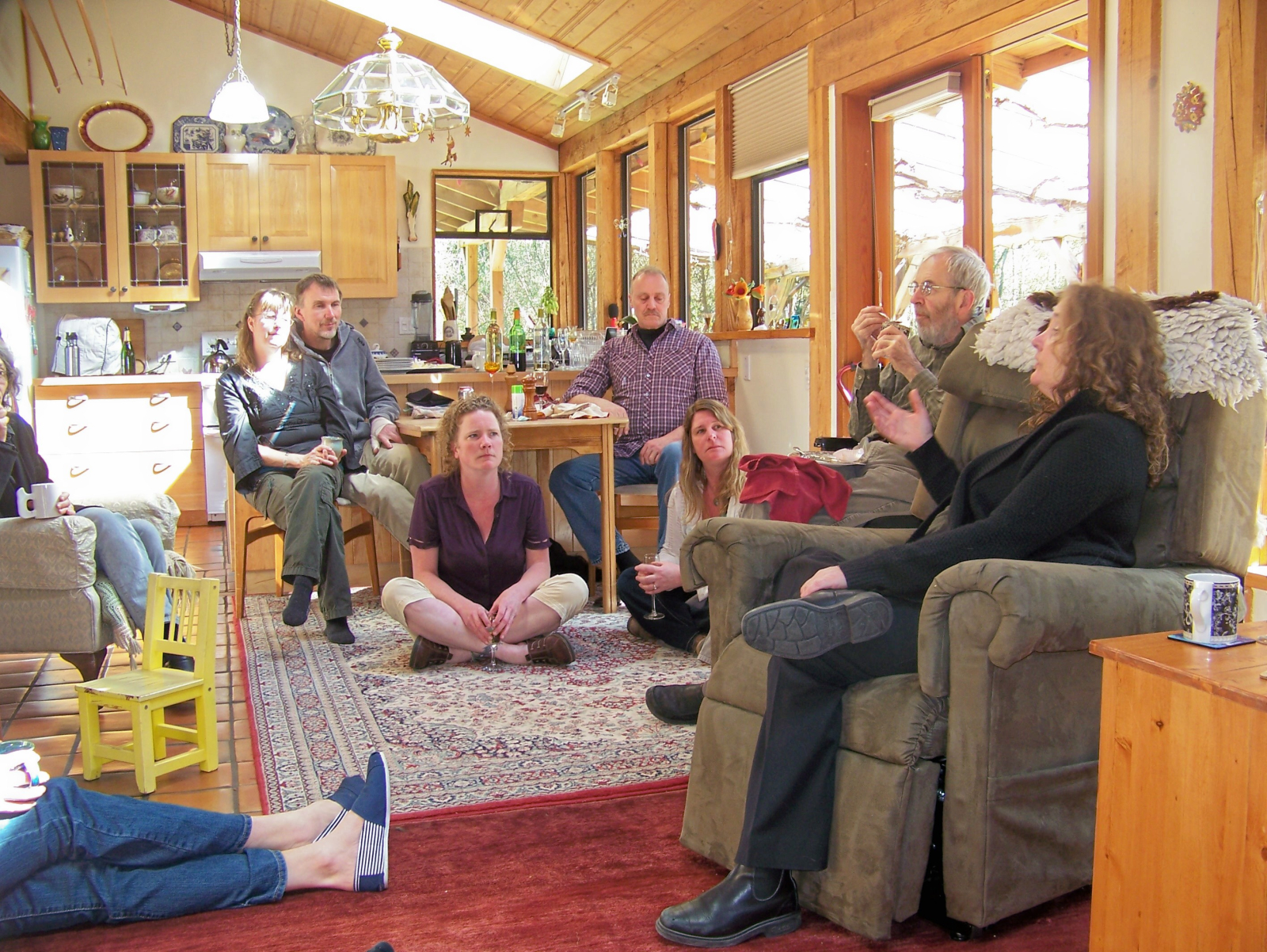
“It was so important for Canada to have a company pursuing these kinds of interests. I wanted to help this company maintain its physical integrity,” Newell says.
And so, in June 2015, New Society Publishers came under employee-shared ownership after a unanimous vote for a shareholder’s agreement granting a newly formed employee trust one-third ownership of the company.
The employee trust was something that Newell was personally keen to pursue after taking three quarter ownership of the company. In contrast to many Silicon Valley start-ups, in which employees end up seeing little or no payback for their exhaustive work and stock options, the New Society Publishers' setup split ownership evenly in thirds, between Newell, the original owners and the employees.
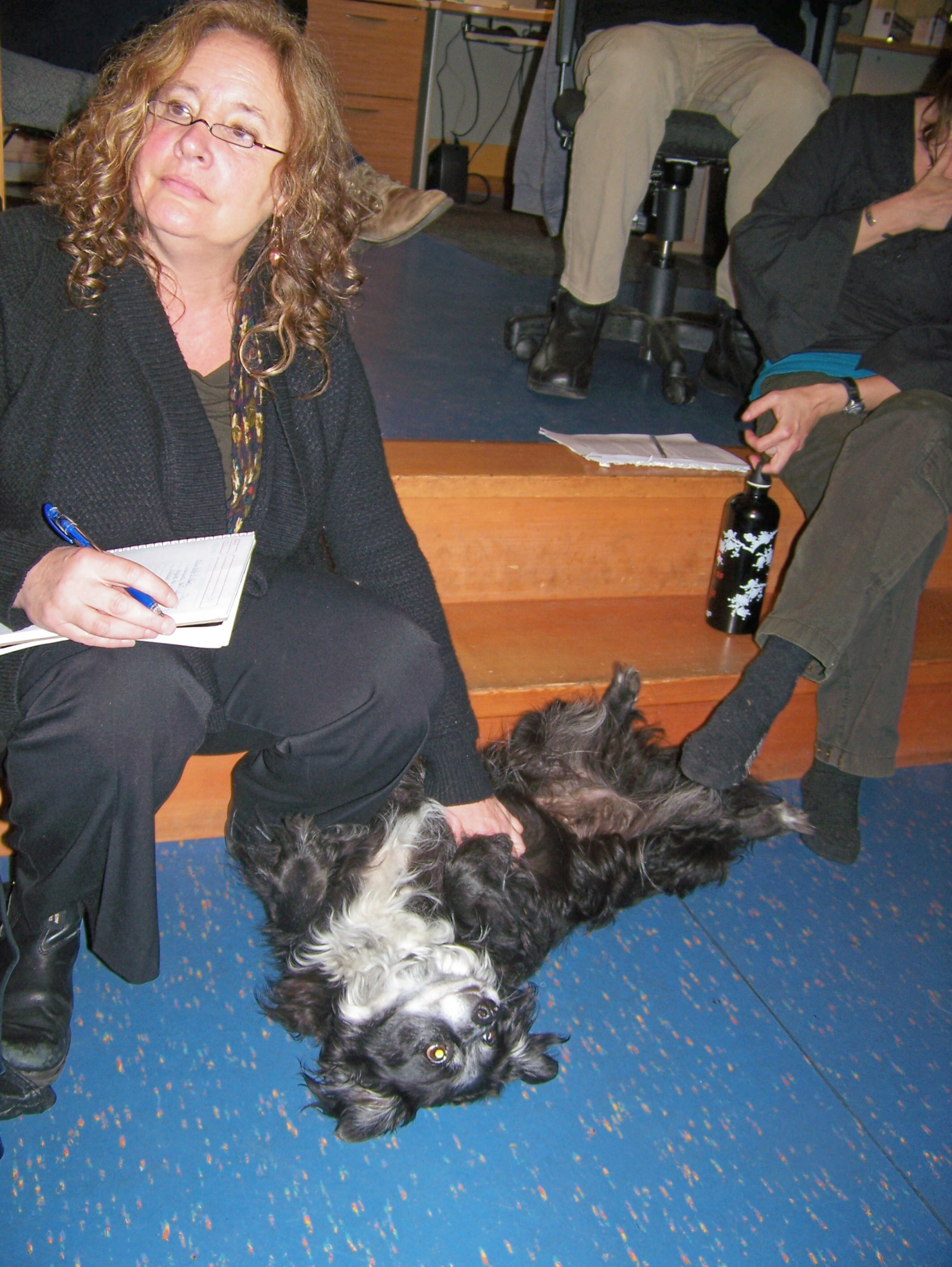
"I felt it was important because New Society Publishers set a completely different tone about what's truly valuable in the world...I felt this needed to be a major part of the company's DNA as well," says Newell.

The founding partners agreed, and after discussing the idea with staff, the employees' trust was created.
Julie Raddysh, daughter of founding partners Judith and Chris Plant, is now the company's director of sales, operations and marketing. She considers the most progressive part of the new model to be that the company’s board of directors has a seat dedicated to a representative of the employee trust. Employees are directly involved in determining the overall direction and governance of New Society Publishers.
“It’s not just an 'incentive program' like a lot of employee trusts are," Raddysh says. "The drive behind it is to put the control into the hands of the people who do it, who work so hard and pour their blood, sweat and tears into it.”

“Not only is it our publishing mandate to provide tools for a world of change, it is also our mission to set an example of a sustainable, environmentally and socially responsible company. Our goal is to be a model business that truly respects this notion and shows the world that doing business for good is a tool for positive change.”
Tools for a world of change
Scroll down to continueThe heart of the company are its books.
New Society has published many hundreds of books on topics ranging from climate change to progressive parenting. The company's best-sellers exceed 100,000 copies. Most famous is the world renowned, Our Ecological Footprint - Reducing Human Impact on Earth by Bill Rees and Mathis Wackernagel, which has been translated and distributed around the globe.
The company's books have found a real niche in the publishing industry. Raddysh credits that success to an earnest commitment to publish solutions and tools that help people create a better life for themselves and for the planet. She describes book fair attendees approaching the New Society Publishers' table full of passion because the books have changed their lives.
These days the company publishes some 24 books a year in both ebook and print format. Many New Society Publishers’ books are also available in audio and get reprinted in foreign languages.
Their "backlist" has emerged as the backbone of the company—again, not a typical phenomenon in the publishing industry, where a book will come off the press, receive its marketing and publicity, and reach its selling peak within a year. Most books will go out of print or languish on the publisher’s backlist.
By contrast, many of New Society's books experience the typical sales peak, but continue to sell strongly for years as topics become more popular or issues more pressing.
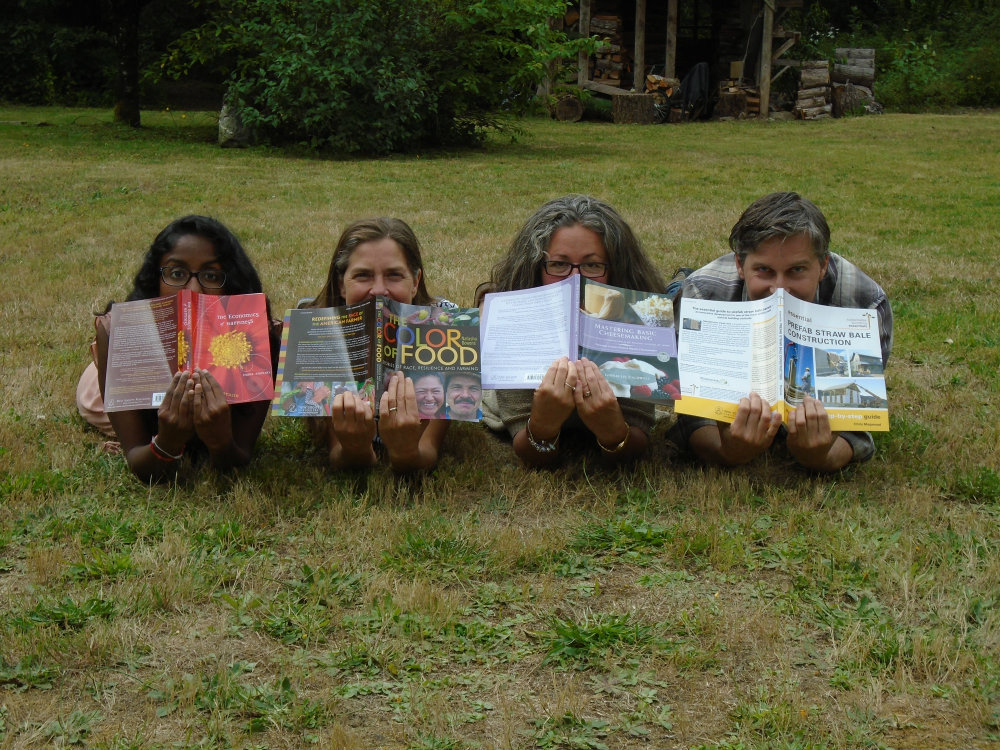
Raddysh says the bread and butter sales come from publications that are 'hands-on,' whether about making social change or making cheese. Some of the popular backlist titles include educational books like Dumbing Us Down — a book by New York educator John Gatto who argues that compulsory schooling does little but teach young people to "follow orders as cogs in the industrial machine." A hard cover, special twenty fifth anniversary edition of this title will be released in the of spring 2017.

Recent strong sellers address aspiring entrepreneurs. The Market Gardener by Québec writer Jean Martin Fortier, gives readers a practical business plan for managing a small-scale market garden.
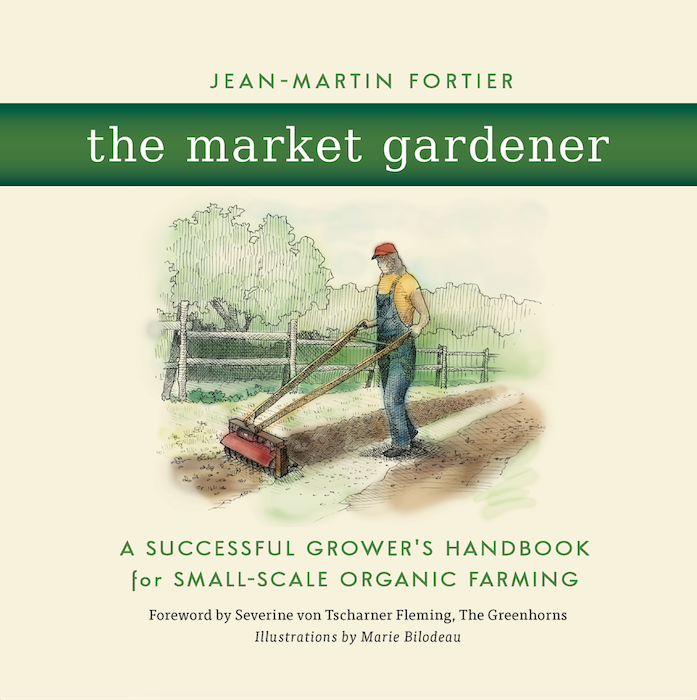
The Urban Farmer: Growing Food for Profit on Leased and Borrowed Land is another popular current title. Author Curtis Stone, a young farmer from B.C., tells his story of leasing other peoples’ front and back yards to grow crops for market, making a very respectable income as well as providing the community with excellent produce.
"It’s great to have Canadian authors who are also rock star farmers across North America,” says Raddysh.
“The books sell well. They practically sell themselves at book tables. People come up and wishfully say, ‘One of each please!' Then linger to discuss new titles or share stories of their own.” Raddysh says. “It’s just as much fun selling a book as it is helping it come to life.”
Origins
Scroll down to continueThe genesis of New Society Publishers took place in Philadelphia back in the early 1970s.
New Society's roots start in a Quaker-based activist collective called The Movement for a New Society (MNS) that arose in response to the Vietnam War. The movement was an early catalyst for the anti-nuclear movement in the U.S.
MNS acquired several old mansions in Philadelphia where people would come and stay while learning how to organize against the war using non-violent civil disobedience. They published pamphlets with titles like "Why Nonviolence?" that were used as training tools for civil disobedience protestors.
New Society Publishers emerged from the MNS collective and published its first full-length book in 1978. Titled Resource Manual for a Living Revolution, it was quickly nicknamed the “Monster Manual” and was thought to contain everything needed to transform society towards peace and nonviolence.
In that same year, on the other side of the continent, Judith met Chris Plant in Vancouver in 1978. Chris had been working as an activist in the South Pacific and had come to Simon Fraser University on a Commonwealth Scholarship.
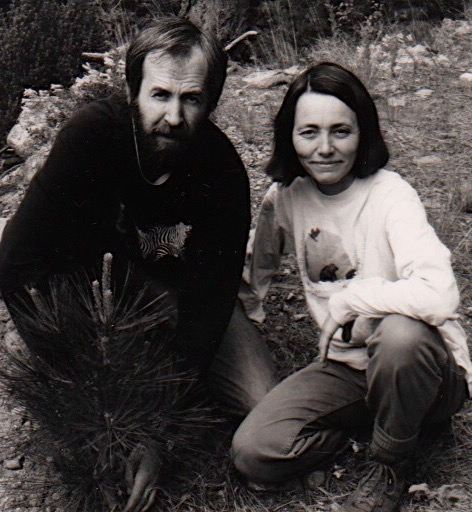
Judith was 30-year-old single mother of three. Chris was 29 and short on cash. She rejected Chris' early advances but became more and more intrigued as she learned about his past work and activism for democracy in the South Pacific. They became a couple and moved to rural B.C. where they joined a group publishing a quarterly magazine called The Catalist, catering to a "list" of members of the food co-op movement. When the food co-op later dissolved, they kept publishing the magazine, transforming it into the New Catalyst.

In addition to the magazine, the couple kept busy homeschooling their children, growing and preserving food and fighting off the threat of logging in the valley around their home.
“So they were publishing similar work to what New Society Publishers was doing in Philadelphia, but in this different format,” Raddysh describes.
In 1986, Judith received an invitation to speak at a bioregional conference in Michigan. One of the exhibitors was New Society Publishers, which had set up a chair right next to their table called the “author's chair.” People with book ideas were encouraged to sit down and discuss their concepts with the editors.
Judith eagerly sat down and both a book and a partnership were born. Judith's Healing the Wounds: The Promise of Ecofeminism was published in 1989. Soon thereafter, the publishers braved the hike up to Judith and Chris's remote mountain cabin and convinced the couple that setting up a New Society Publishers operation in Canada would allow them to reach more people than New Catalyst ever would.

For the next five years, Judith and Chris operated a satellite office of New Society Publishers from their home in B.C.
But in 1995, at an annual meeting in Philadelphia, New Society Publishers's financial troubles came to a head. People who’d worked for the organization for years were burnt out. Judith and Chris resolved to keep it alive by moving all its operations to Canada.
The move to Canada had challenges they hadn't foreseen. The company struggled to find Canadian distributors, and the federal government determined that it was ineligible for government grants, since much of the content was non-literary and many of the authors weren't based in Canada.
The company struggled financially and it became, in Raddysh’s words, a “ma-and-pa company.” Raddysh remembered how her parents “worked their butts off” around the clock, with only one of them taking a salary at a time.
During an especially difficult stretch, a Vancouver lawyer suggested Chris and Judith contact an acquaintance named Joel Solomon for help and advice. As it turned out Solomon had been a subscriber to the New Catalyst from his original home in Tennessee and had recently moved to British Columbia’s Cortes Island. Even more serendipitously, he was launching Renewal Partners, a venture capital business on behalf of Carol Newell, a conservationist who would later be widely recognized for her philanthropic and innovative business collaborations.
In 1996 Chris and Judith formed a corporation and, together with Renewal Partners, the company approached the Business Development Bank. They put their property up as collateral and wrangled enough money to purchase New Society Publishers outright.
To develop new categories of books, the couple went to events such as the US Green Building Council’s annual trade show and conference. They had a hunch that the early days of green building heralded a much bigger industry.
“The field was wide open for us,” Judith remembers.
By 2006, the business was a success, but for Chris and Judith it was time to consider retirement and they were thinking of selling. Around the same time, Judith noticed that Chris had trouble writing legibly on credit card slips and was fatigued in the afternoons. It was very bad news indeed. Chris had Parkinson’s Disease.
Two years later, they sold the company to Vancouver-based publishers, Douglas and McIntyre. Judith agreed to stay at the helm as the publisher. As it turned out, Douglas and McIntyre was also to go bankrupt, but this turned out to be the door to a new transition for New Society Publishers, toward its current form as an employees' trust.
Walking the talk
Scroll down to continueToday, New Society Publishers is a solid business, with an innovative structure and a creative team.
The company was recently awarded B Corp certification. It's a prestigious certification given to companies that meet rigorous standards of social and environmental performance. New Society Publishers scored 105 points, well above the B Corp average of 80 points.
"New Society Publishers has been a virtual B Corp for years; the certification just makes it official," said award-winning sustainability writer and speaker Bob Willard, of the announcement. "I’ll add this to my long list of reasons that I am proud that you are my publisher."
The company is certainly "walking the talk" and continues to push the boundaries of sustainable business.
In 2015, New Society Publishers had reduced its carbon emissions to 2005 levels. This year, the company has reduced their emissions even further through in-house conservation measures such as digital catalogues, using electronic proofing for books at press, and taking a comprehensive approach to conservation in day-to-day work practices.
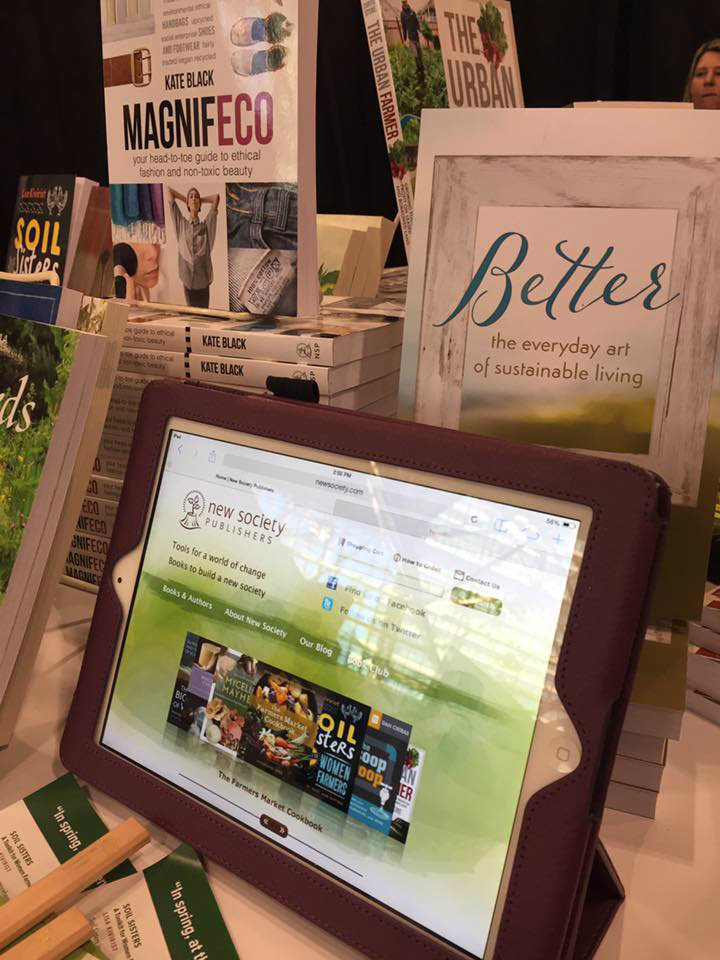
True to form, the company even produced a Guide to Responsible Digital Reading in an effort to help readers cut back on their consumption of paper products and be aware of the environmental costs associated with using and disposing of electronic readers.
New Society doesn't limit itself to its own operations either. They send digital book copies to reviewers, and choose to work with other companies only if they share a congruent values-based approach.
“We push our suppliers to meet high expectations, and encourage them to consider our environmental concerns, and select companies with similar values to work with,” Raddysh says.
New Society Publishers is also engaging more of its readers through social media and videos to accompany its books.

The company has launched a new book series, called "Sustainable Building Essentials,” that covers the complete range of natural and green building techniques with a focus on sustainable materials, methods and code compliance.
As part of a promotion for one of their books, editor Rob West and his colleagues film themselves attempting to build a cob floor, following the instructions from Earthen Floors, one of the company's books on sustainable building. Getting their hands dirty, the staff mix clay and sand to demonstrate some of the techniques described in the title.
Raddysh says she hopes New Society Publishers will continue to be a team that forges a new model for book publishers around the world.
“I love our history, the embedded strength of our company and our collective will to be better than even our own expectations.” Raddysh says. “It is exactly this passion that has kept this company going for all these years — through thick and thin — and it will be what continues to make us a leader in sustainable publishing both in content and in our business structure.”
Raddysh sees a bright future ahead. “Our goal is to continue doing what we are doing and strive to be a model publisher as we do it. New Society Publishers is known for providing the best books out there on sustainable living and we intend to continue to enrich the list every year. We continue to find organizations to collaborate with, find fantastic authors, put ourselves out into our market and enjoy knowing we are doing all we can to make the world a better place.”
